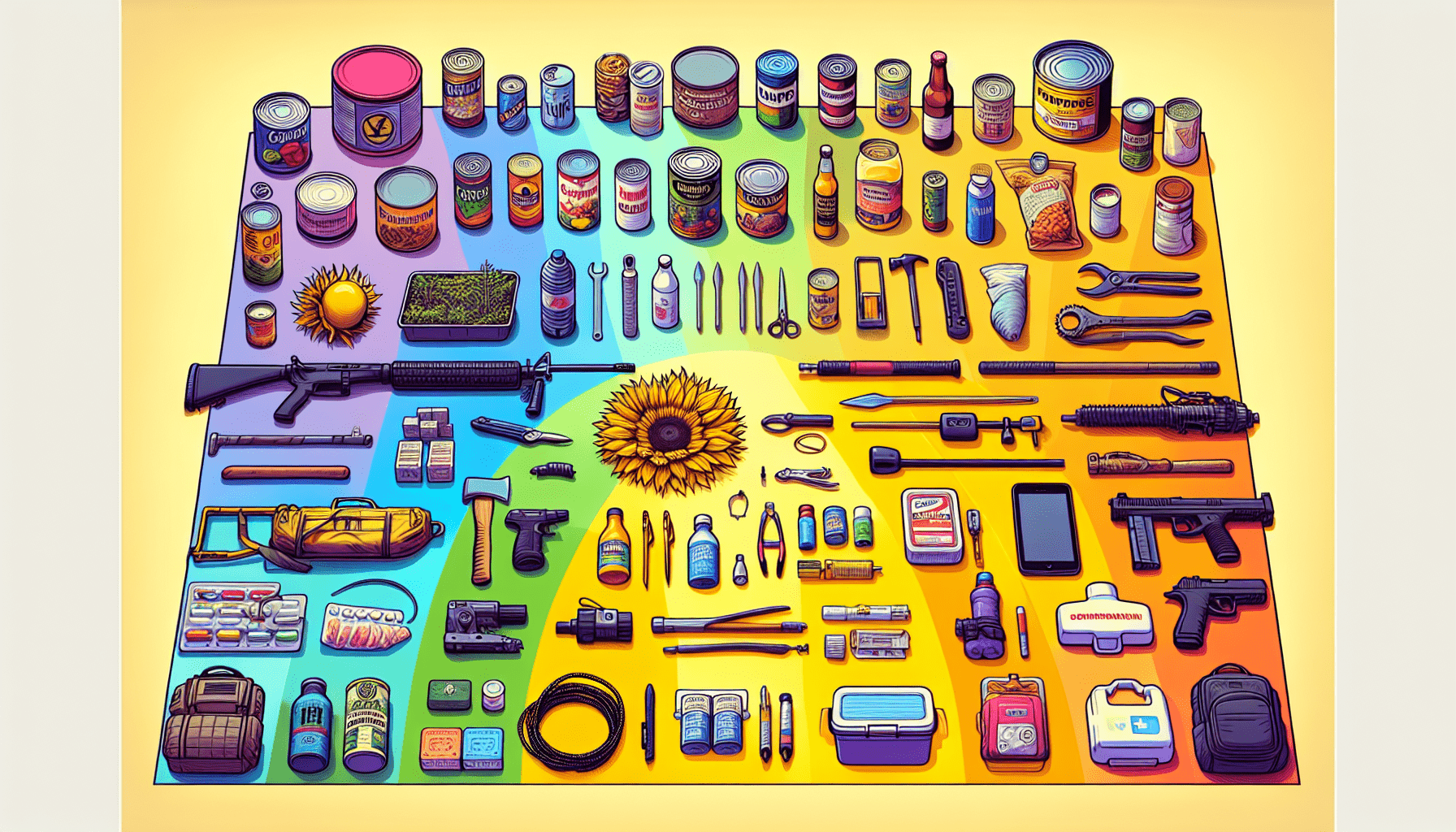In this article, you’ll discover the most effective tactics for bartering and trading as a prepper. When disaster strikes and resources become scarce, having the skills to exchange goods and services is invaluable. From identifying high-demand items to developing negotiation techniques, these strategies will empower you to navigate post-apocalyptic scenarios with confidence. Unlock the secrets to successful prepper bartering and trading and ensure your survival in uncertain times.

Identify High-Demand Items
Research and assess potential scenarios
When preparing for bartering and trading in a post-collapse society, it’s crucial to research and assess potential scenarios that may arise. Consider different disaster scenarios such as natural disasters, economic collapse, or political instability. Understanding the possible outcomes will help you prioritize the types of goods and resources that may be in high demand.
Consider basic needs and essentials
In any post-collapse situation, basic needs and essentials such as food, water, shelter, and medical supplies will always be in high demand. These should be your primary focus when stockpiling items for potential trading. Look for non-perishable food items, water purification systems, first aid kits, and building materials that can help meet those fundamental needs.
Evaluate the value and scarcity of items
While basic needs are important, it’s also essential to evaluate the value and scarcity of other items that may become highly sought after. Items like ammunition, fuel, tools, and personal hygiene products can be valuable commodities in a post-collapse society. Conduct thorough research to determine what items may become scarce and prioritize them in your trading and stockpiling efforts.
Gathering and Stockpiling
Accumulate a diverse range of goods
To be successful in bartering and trading, it’s important to accumulate a diverse range of goods. This ensures that you have a variety of items to offer, increasing your chances of finding suitable trading partners. Consider collecting items in different categories like food, medical supplies, tools, clothing, and other essential goods.
Consider long-term storage options
Proper storage is crucial to maintain the quality and usability of your stockpile. Look for long-term storage options such as vacuum-sealed bags, Mylar bags, and food-grade containers. Store your goods in a cool, dry place away from direct sunlight. This will help extend the shelf life of perishable items and protect non-perishables from deterioration.
Rotate and update stock
Regularly assess and rotate your stockpile to ensure the items remain fresh and usable. When acquiring new goods, use the oldest items first to prevent them from expiring or going to waste. It’s also essential to stay updated on product recalls or changes in expiration dates to maintain the value of your stock.
Build a Network
Connect with like-minded individuals
Building a network of like-minded individuals is crucial for successful bartering and trading. Seek out individuals who share your prepping mindset and are open to collaborative efforts. Join local survivalist or prepper groups and attend meetings or events where you can meet potential trading partners.
Attend prepper and survivalist events
Prepper and survivalist events are excellent opportunities to connect with like-minded individuals and learn from experts in the field. These events often feature workshops, talks, and demonstrations that can help expand your knowledge and network. Be open to sharing ideas and experiences with others, as this can lead to valuable connections for future trading opportunities.
Join online communities and forums
In addition to attending physical events, joining online communities and forums is an excellent way to connect with a larger network of preppers and survivalists. These platforms allow you to interact with individuals from different geographical locations who may have access to unique resources. Engage in discussions, ask questions, and offer your own insights to establish meaningful connections for trading.
Establishing Barter Systems
Create a trade network
Establishing a trade network is essential for successful bartering. This network can consist of individuals, groups, or trading posts where goods and services are exchanged. Identify trustworthy individuals within your network who have complementary skills or resources. Create a system where you can trade directly or through trusted intermediaries.
Develop a barter currency or medium of exchange
In a post-collapse society, traditional currency may lose its value. Consider developing a barter currency or medium of exchange that holds value among your trading network. This can be in the form of physical items like gold, silver, or ammunition, or even a system where specific skills or services are traded as a form of currency.
Set up trading posts or locations
To facilitate trading, consider setting up trading posts or predetermined locations where individuals can come together to exchange goods. These locations should be easily accessible, secure, and well-known within your trading network. It’s important to establish rules and protocols to ensure fair and ethical trading practices are maintained.

Negotiation and Communication
Learn effective negotiation tactics
Negotiation plays a crucial role in successful bartering and trading. Learn effective negotiation tactics that can help you obtain the best possible trade deals. Research and practice techniques such as active listening, compromising, and finding win-win solutions. Being open-minded and flexible in negotiations can greatly improve your chances of striking beneficial trades.
Practice good communication skills
Clear and effective communication is key when engaging in bartering and trading. Clearly express your needs, offerings, and expectations to potential trading partners. Be open to questions and discussions while actively listening to others’ perspectives. Good communication builds trust and fosters mutually beneficial trade relationships.
Understand the value of compromise
Remember that compromise is often necessary in bartering and trading. Understand that both parties involved have their own needs and interests. Be willing to make concessions when negotiating and find common ground that benefits both parties. A willingness to compromise demonstrates your commitment to fair and ethical trading practices.
Assessing the Needs of Others
Recognize specific needs and interests
To be successful in bartering and trading, it’s crucial to assess and recognize the specific needs and interests of potential trade partners. Observe their circumstances, preferences, and any challenges they may be facing. Tailoring your offerings to cater to these specific needs increases the chances of a successful trade.
Identify potential trade partners
Identifying potential trade partners within your network is key. Look for individuals who possess valuable resources or skills that you may require in the future. Building mutually beneficial trade relationships with those who have complementary assets can enhance your own trading capabilities.
Offer goods or services that cater to those needs
Once you have identified potential trade partners and their specific needs, focus on acquiring goods or developing skills that cater to those needs. Offering goods or services that are highly valued and in demand among your trade partners increases the chances of successful trades. Adapt your stockpile and skillset accordingly to meet the evolving needs of your trading network.
Maintaining Trust and Reputation
Follow through on promises and agreements
Maintaining trust is essential in any bartering and trading relationship. Always follow through on promises and agreements you make with your trade partners. Failing to do so can damage your reputation and hinder future trading opportunities. Be dependable and reliable to build a solid foundation of trust within your trading network.
Honor trade ethics and fair practices
Adhere to trade ethics and fair practices when engaging in bartering and trading. Treat others with respect, honesty, and fairness. Avoid engaging in unethical practices such as price gouging or deceptive trades. Acting with integrity helps build a positive reputation and encourages others to engage in fair trades with you.
Build a positive reputation for reliability and honesty
Word of mouth plays a significant role in establishing a positive reputation as a reliable and honest trader. Deliver on your promises, provide quality goods or services, and conduct yourself with transparency. Building a positive reputation takes time and effort but is crucial for long-term success in bartering and trading.
Learning and Acquiring Useful Skills
Develop skills that hold value in a post-collapse society
In a post-collapse society, certain skills become even more valuable and desirable. Identify and develop skills that will hold value in such a scenario. Skills like gardening, first aid, carpentry, hunting, and food preservation can be highly sought after. Continuously improve and expand your skillset to increase your trading options.
Offer skills-based services for trade
In addition to stockpiling goods, offer skills-based services for trade. Providing services such as medical assistance, repairing tools, or teaching valuable skills can be valuable commodities in a bartering economy. Be proactive in sharing your skills and knowledge within your trading network to attract potential trade partners.
Continuously learn and adapt to changing situations
A key aspect of successful prepper bartering and trading is the ability to continuously learn and adapt to changing situations. Stay informed about current events, trends, and market conditions that can affect the availability and demand for certain goods or services. Adjust your trading strategies accordingly to maximize your success.
Security and Confidentiality
Ensure the safety of goods and trading operations
Maintaining the safety of your goods and trading operations is crucial. Implement security measures to protect your stockpile, such as securing the location, utilizing surveillance systems, or establishing trusted guards if necessary. Minimize the risk of theft or sabotage to ensure the longevity and viability of your trading endeavors.
Establish trust before disclosing sensitive information
Before disclosing sensitive information about your stockpile or trade network, establish trust with potential trade partners. Share information gradually and only with individuals who have proven their reliability and integrity. Trust is earned, and it’s important to prioritize security and confidentiality when engaging in bartering and trading.
Maintain discretion and confidentiality
Maintain a level of discretion and confidentiality when discussing your trading activities. Avoid unnecessary exposure or discussions of your stockpile and trading operations with individuals who are not part of your trusted network. Keeping a low profile can help safeguard your resources and prevent potential security risks.
Adapting to Changing Circumstances
Be flexible and adaptable in trading strategies
Bartering and trading strategies should be flexible and adaptable to changing circumstances. As market conditions, needs, and availability shift, be prepared to adjust your offerings and trading approaches accordingly. Continuously evaluate the effectiveness of your strategies and make necessary changes to maximize success.
Stay updated on current events and trends
Stay informed about current events, trends, and developments that may impact your trading activities. This includes tracking supply chain disruptions, market fluctuations, and shifts in demand for certain goods or services. The ability to anticipate and respond to changing circumstances will give you an edge in bartering and trading.
Adjust strategies based on supply and demand
Supply and demand play a significant role in the success of your bartering and trading efforts. Assess the available supply of a particular item and the demand within your trading network. Adjust your strategies accordingly, taking advantage of opportunities where supply is scarce or demand is high. Being proactive and responsive to the dynamics of supply and demand will increase your trading success.
By following these best strategies for prepper bartering and trading, you’ll be better prepared to navigate the challenges of a post-collapse society. Remember, building a strong network, acquiring valuable skills, and maintaining trust and ethics are essential components of successful trading. Adapt to changing circumstances and always prioritize the needs of both yourself and your trading partners. Stay resilient, resourceful, and open-minded, and you’ll thrive in the challenging but opportunity-rich world of post-collapse bartering and trading.
